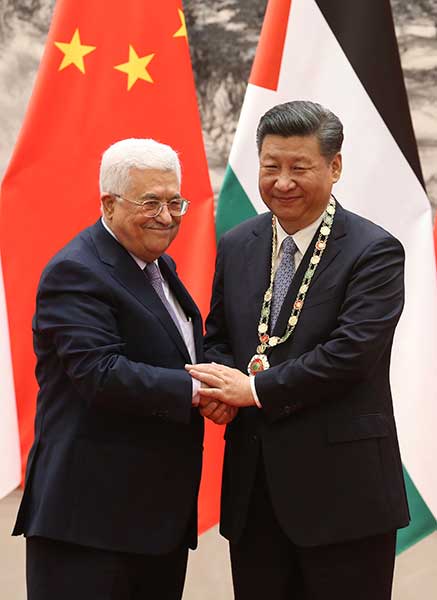President Xi Jinping welcomes Palestinian President Mahmoud Abbas on Tuesday at the great Hall of the People in Beijing. Xi received the highest Palestinian medal from Abbas.Wu Zhiyi / China Daily
|
BEIJING - Palestinian President Mahmoud Abbas has concluded his state visit to China, during which President Xi Jinping put forward a new four-point proposal on the Palestine issue.
Analysts said that Abbas paid his visit to China, from July 17-20, at a time when the Palestine-Israel peace talks remain stalled, US President Donald Trump's policies towards Palestine and Israel remain elusive, and China is pushing the Belt and Road Initiative in the Middle East.
Currently, the Palestine issue seems to have been marginalized as frequent conflicts have been popping up in the Middle East in recent years after the last round of peace talks between Israel and Palestine stalled in 2014.
Palestine wishes the world would pay attention once again to its issue and provide assistance.
During the talks with Abbas on Tuesday, Xi made a new four-point proposal that had more content than the previous version, which Xi made in May 2013 during Abbas's visit to China.
In the new proposal, Xi not only reiterated that China supports a two-state solution to the Palestine issue and supports Palestine in building an independent, fully sovereign state along the 1967 borders with East Jerusalem as its capital, but also introduced new initiatives.
These initiatives include China's concrete measures to back Palestine's economic development, such as supporting Chinese companies to invest in Palestine and build industrial parks and solar power plants together with the Palestinian side.
Meanwhile, as Palestine's border, customs and infrastructure facilities are currently under Israel's control, China has proposed ways to ensure the implementation of these measures, such as a tripartite dialogue mechanism among China, Palestine and Israel to promote major projects to assist the Palestinian side.
Under the proposal, China will host a symposium on peace between Palestine and Israel later this year.
Chen Shuangqing, a Middle East expert from the China Institute of Contemporary International Relations, said that promoting contacts and communications between Palestine and Israel through non-governmental channels might help re-start the Palestine-Israel political dialogue.
During Abbas's visit to China, China's new thinking on the Middle East issue - promoting peace through development - was clearly reflected in China's new moves on the Palestine-Israel issue, said Wu Sike, China's former special envoy to the Middle East.
President Xi mentioned the new thinking for the first time in a speech delivered at the headquarters of the Arab League in Egypt in January 2016, Wu said, adding Abbas's just-concluded visit made this new thinking clearer.
On the Palestine-Israel issue, China has its own advantages as it maintains good ties with both Palestine and Israel and is able to mediate between them, Chen said.
China is expected to play a bigger role in the Middle East in the future, especially as the China-proposed Belt and Road Initiative advances in the region, said Wu Yihong, a Chinese expert on the Middle East.








